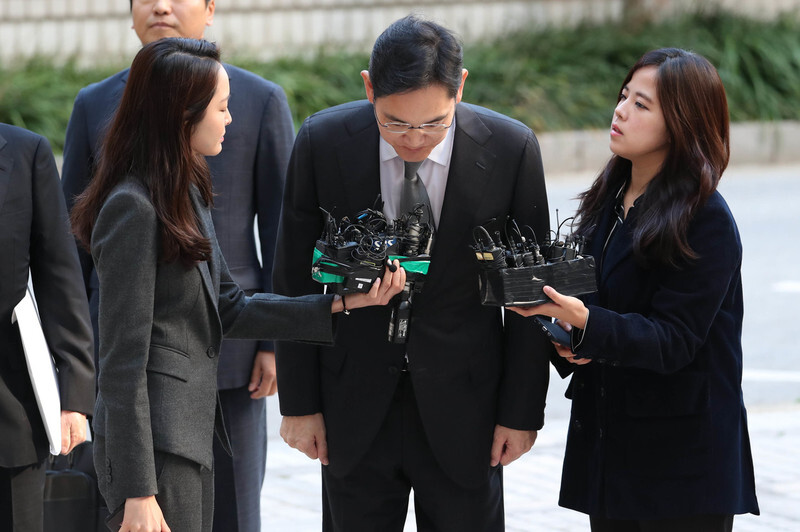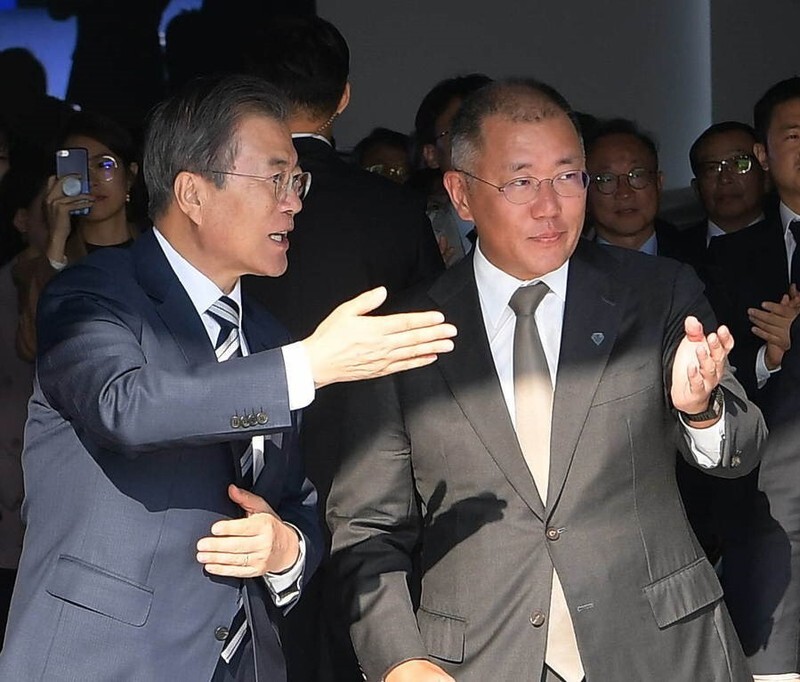hankyoreh
Links to other country sites 다른 나라 사이트 링크
[Column] Lee Jae-yong’s stark contrast with Hyundai Motors’ Chung Eui-sun

Samsung Electronics celebrated its 50th anniversary on Nov. 1. “Let’s make a healthier and happier future with Korean technology.” While a message from Vice Chairman Lee Jae-yong had been expected, there was no real sign of a vision for overcoming Samsung’s current crisis and paving the way for the next 50 years.
The groundwork for the company’s rise to number one in the area of semiconductors was laid in 1983 when Lee Byung-chul, founder and chairman, ventured into memory semiconductors despite the objections of those around him. His son Lee Kun-hee ushered in the “global Samsung” transformation with a “new management declaration” in 1993 that called for “changing everything but the wives and children.” An executive at one Samsung affiliate explained, “In the five years since he became the de facto head after Lee Kun-hee fell ill in May 2014, Lee Jae-yong has never come out with a vision that expresses his own management philosophy.”
I am not the only one voicing concerns about the fading of this tradition of bold innovations and decisions by Samsung’s past heads to propel its growth into a global business. On Oct. 25, the first hearing was held in Lee’s bribery case following its reversal and remand. The judge, Hon. Jeong Joon-yeong, noted that “in 1993, at the age of 51, Lee Kun-hee declared a new management approach and overcome a crisis with bold innovation.” He then asked Lee Jae-yong, “What is your declaration as you also turn 51 in 2019?”
Some have countered that Lee Jae-yong is not actually Samsung’s head, since Lee Kun-hee is still alive. But while Lee Kun-hee lives on, the era of him as a chairman ended five and a half years ago. Perhaps there simply hasn’t been time, with one major incident after another over the past five years: allegations of unfairness in the Samsung C&T/Cheil Industries merger, the offering of bribes to government influence-peddlers, union-busting operations, accounting fraud at BioLogics, and so on. But both of them were things Lee brought on himself for the sake of his succession to the management reins.

Lee’s failure to live up to his responsibility as head of Samsung
The “hottest” figure in the business world these days is Chung Eui-sun, executive vice chairman of Hyundai Motor Company. Chung’s circumstances stands in contrast to the battle Lee is facing. Since taking on the role of company head in September 2018 after his father Chung Mong-koo fell ill, Chung has been relentlessly pursuing changes: to the business structure, the organization, working methods, and personnel. In an Oct. 23 conversation with employees, he bluntly stated, “The past five to 10 years have been stagnant. The changes so far are just the tip of the iceberg.” As a vision for the direction of future projects, he announced plans to “reduce the proportion of automobile manufacturing to 50%, with personal aircraft to account for 30% and robotics for 20%.” A Hyundai Motor executive laughed, “What used to be the most conservative of the groups is now the one that’s changing the fastest.”
The decision to take new risks was unavoidable for Hyundai Motor, which has struggled with chronic oversupply and difficulties adapting to the future vehicle era. While it remains to be seen whether Chung will be successful, it is a positive sign that he is tackling the crisis head on without shying away from his responsibilities as a top manager. His actions have drawn praise from those around him. An executive at one of South Korea’s top 10 conglomerates told me, “He’s seen as kind of a role model among the third generation of chaebol families.” Kim Sang-jo, chief of staff at the Blue House, commented in private that he welcomed Chung’s presence. “If chaebol heads were all like that, I don’t think the people of South Korea would have anything to worry about,” he said.
In contrast, Lee Jae-yong’s image as a “hothouse flower” has only hardened in the 18 years since he first became an executive in 2001. A former Samsung executive said, “He’s never once taken on a position where he’s been held responsible for management performance.” It’s the role of a chaebol head to identify management themes and directions -- and it can be fatal if they don’t play their part.
Doubt concerning Lee’s next-generation display investmentAlso troubling is the impression that Lee Jae-yong seems to care more about his own security than Samsung’s future. The Supreme Court calculated the amount involved in the bribery case at 8.6 billion won (US$7.43 million) and acknowledged that the purpose was to grease the wheels for management succession. Common sense suggests the likelihood of a suspended sentence emerging from the case is low. Yet Lee seems unable to let go of his fixation, carrying on with efforts to play up his own presence through large-scale investment plan announcements, on-site visits, and the like.
A Samsung executive admitted, “There’s a very real danger that the 13 trillion won [US$11.23 billion] next-generation display investment plan he announced during President Moon’s visit will fail.” Samsung’s “Lee Jae-yong mire” seems to only be deepening.
“I have decided today to step down as chairman of Samsung. I offer my sincere apologies and will fulfill my legal and ethical responsibilities accordingly.”
In April 2008, Lee Kun-hee delivered an apology to the people of South Korea and announced plans for reforms that included his own departure from management. This happened soon after his indictment by the Samsung special prosecutor on charges of holding over 4.5 trillion won (US$3.89 billion) in borrowed-name accounts. Lee went on to say, “The people of South Korea have played a great part in Samsung becoming what it is today, and I hope you will continue to cherish Samsung and help develop it into a first-class global company.” Hopefully Lee Jae-yong will look back upon his own father’s decision from 11 years ago -- before it’s too late.
By Kwack Jung-soo, business correspondent
Please direct comments or questions to [english@hani.co.kr]
Editorial・opinion
![[Column] Season 2 of special prosecutor probe may be coming to Korea soon [Column] Season 2 of special prosecutor probe may be coming to Korea soon](https://flexible.img.hani.co.kr/flexible/normal/500/300/imgdb/original/2024/0426/3317141030699447.jpg) [Column] Season 2 of special prosecutor probe may be coming to Korea soon
[Column] Season 2 of special prosecutor probe may be coming to Korea soon![[Column] Park Geun-hye déjà vu in Yoon Suk-yeol [Column] Park Geun-hye déjà vu in Yoon Suk-yeol](https://flexible.img.hani.co.kr/flexible/normal/500/300/imgdb/original/2024/0424/651713945113788.jpg) [Column] Park Geun-hye déjà vu in Yoon Suk-yeol
[Column] Park Geun-hye déjà vu in Yoon Suk-yeol- [Editorial] New weight of N. Korea’s nuclear threats makes dialogue all the more urgent
- [Guest essay] The real reason Korea’s new right wants to dub Rhee a founding father
- [Column] ‘Choson’: Is it time we start referring to N. Korea in its own terms?
- [Editorial] Japan’s rewriting of history with Korea has gone too far
- [Column] The president’s questionable capacity for dialogue
- [Column] Are chaebol firms just pizza pies for families to divvy up as they please?
- [Column] Has Korea, too, crossed the Rubicon on China?
- [Correspondent’s column] In Japan’s alliance with US, echoes of its past alliances with UK
Most viewed articles
- 1Samsung subcontractor worker commits suicide from work stress
- 2‘We must say no’: Seoul defense chief on Korean, USFK involvement in hypothetical Taiwan crisis
- 3Is Japan about to snatch control of Line messenger from Korea’s Naver?
- 4Division commander ordered troops to enter raging flood waters before Marine died, survivor says
- 5[Editorial] Korea’s surprise Q1 growth requires objective assessment, not blind fanfare
- 6No good, very bad game for Korea puts it out of Olympics for first time since 1988
- 7US overtakes China as Korea’s top export market, prompting trade sanction jitters
- 8Korea’s 1.3% growth in Q1 signals ‘textbook’ return to growth, says government
- 9N. Korean delegation’s trip to Iran shows how Pyongyang is leveraging ties with Moscow
- 10[Column] Season 2 of special prosecutor probe may be coming to Korea soon